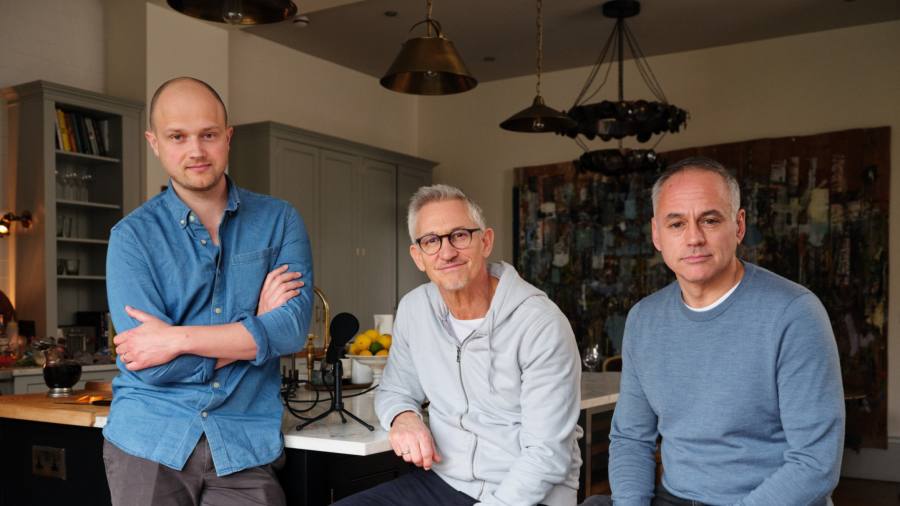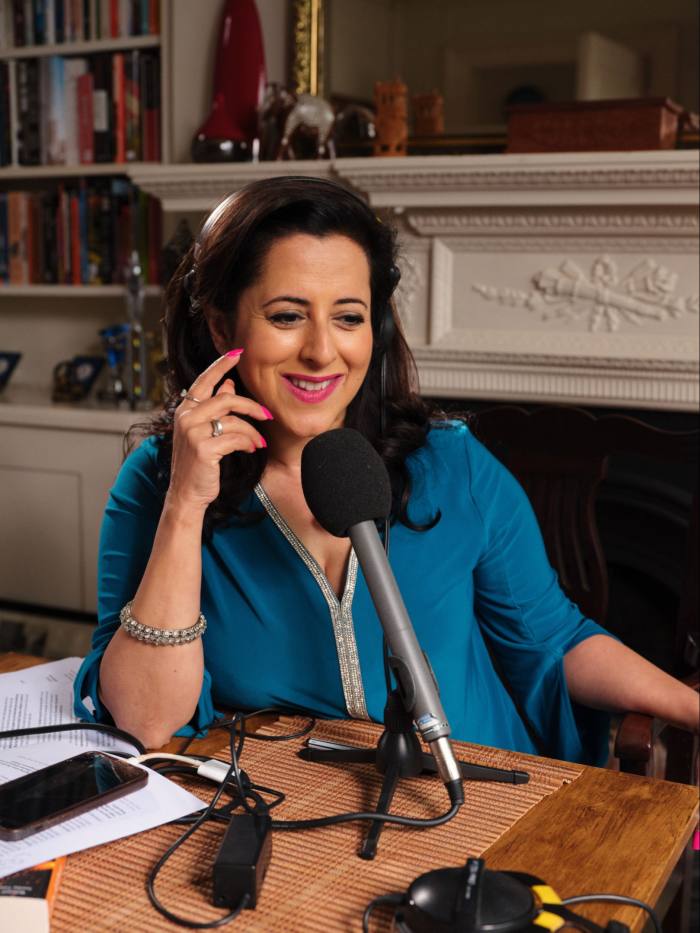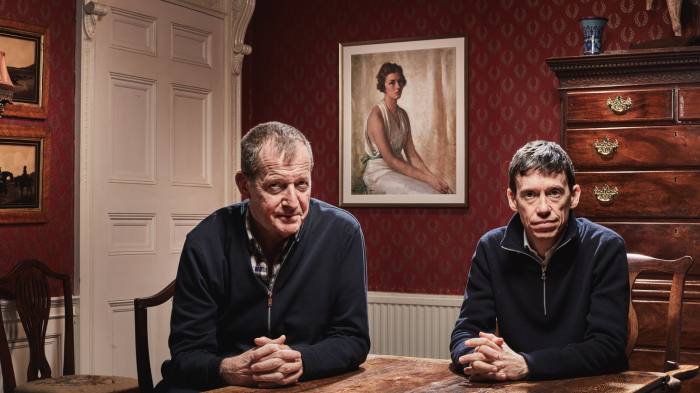
When the UK Premier League season starts in August, it will have a new companion: a podcast called The Rest is Football, co-hosted by Gary Lineker. The former England striker and longtime television sports presenter is already the BBC’s highest paid employee, earning £1.35mn in 2021-22. But the new move is personal: instead of answering to others, he is in charge.
Lineker, who was briefly suspended by the BBC as presenter of its flagship football show Match of the Day in March for criticising the government’s asylum policy, doubles as founder of one of the UK’s biggest and fastest growing podcast production companies. Goalhanger Podcasts already makes two of the UK’s best-known podcasts: The Rest Is History and The Rest Is Politics.
Goalhanger claims to be the UK’s largest independent podcast group, with 17.5mn downloads a month. But Lineker still struggles slightly to explain its success: “I think we started early, recognised that podcasting was going to be interesting, got a bit lucky and made some good choices . . . The business is performing staggeringly well.”
He does not shy from controversy, but Goalhanger’s biggest insight has been that many listeners enjoy calm and good humour. The Rest Is Politics is presented by Alastair Campbell, Labour’s former head of communications, and Rory Stewart, former Conservative MP. They are centrists who agree on many things and spar about others without rancour.
“There is so much tribalism and division, it feels as if those who shout loudest get the attention . . . We thought that if we had two presenters with reasonable politics, that might work,” Lineker says. “People love it, which is the most satisfying thing.”

Goalhanger’s most popular podcast is The Rest Is History, co-presented by historians Tom Holland and Dominic Sandbrook. Launched in 2020, it has covered everything from the killing of Julius Caesar to the rise of the Nazis. The show is downloaded more than 6mn times a month, with more than half of its listeners hailing from outside the UK.
Holland and Sandbrook’s amiable banter as they tour through episodes in history has set the tone for Goalhanger, as well as establishing The Rest Is . . . brand. “We don’t have people shouting at each other from different positions,” says Tony Pastor, co-founder of Goalhanger. “We always try to maintain a civility of tone: our phrase is, ‘We disagree agreeably.’”
Holland was bemused when Goalhanger first approached him in 2019. “I cannot tell you how ignorant I was about podcasting,” he says. He and Sandbrook have since learnt on the job and Goalhanger has expanded as a business: its podcast revenues are expected to double this year.
That is profitable for everyone involved. The podcasts work on a revenue-sharing model: hosts on its main titles do not receive a salary, but get a third of their podcast’s revenues each, with Goalhanger taking the other third. This is a strong incentive to keep on producing material and to promote other Goalhanger shows.
The company does not disclose pay but it is highly rewarding: Stewart has called it “Championship footballer money” and it is common for such players to earn thousands of pounds a week. “We operate like a mini-collective, with the hosts having a significant stake. Without getting into numbers, it can be life-changing,” Pastor says.
Such rewards change the calculation for top presenters. Emily Maitlis, Lewis Goodall and Jon Sopel left the BBC last year to host a competitor to The Rest Is Politics, Global’s The News Agents. This autumn, Goalhanger will also launch The Rest Is Money, a business podcast presented by Robert Peston, ITV’s political editor, and the Channel 4 presenter Steph McGovern.
The podcasts initially arose out of frustration. Pastor left his job as controller of sport at ITV in 2013 to form a production group called Goalhanger Films with Lineker. But there are many ideas for TV programmes and few slots, so they also tried out another football podcast called Behind Closed Doors, with Lineker and the comedy writer Danny Baker.
It ran until 2020, but Pastor was already thinking beyond sports. He is a second world war history buff but could not find a good podcast on it, so he approached the historian James Holland, Tom’s brother. The result was We Have Ways of Making You Talk with James Holland and the comedian Al Murray, starting with an episode on Spitfires and General Patton.
We Have Ways became a hit, soon to be surpassed by other Goalhanger podcasts with a similar style. “It is like listening in on a conversation between two mates who know a lot about something that you’re quite interested in as well,” Pastor says.
Anita Anand, co-host with William Dalrymple of Goalhanger’s Empire podcast, which has passed 10mn downloads, calls it “a corner table at the pub where the two of us are braying loudly and anyone is allowed to pull up a chair”. Tom Holland describes it as a less highbrow version of a BBC Radio 4 programme: “In Our Time down at the pub.”
Chemistry is what keeps listeners coming back: Holland and Sandbrook have produced more than 300 episodes of History. “You need a relationship to build on, and then everything else flows from that,” says Jack Davenport, a BBC radio producer who joined last year to found Goalhanger Podcasts as a separate entity.

The addition of Anand, and now McGovern, has given Goalhanger greater gender balance: its two most popular shows are still hosted by men. The UK podcast audience too is both younger and more male than that of live radio: 58 per cent of podcast listeners last summer were men, according to Rajar, the research group. But Tom Standen-Jewell, an analyst with Enders Analysis, says that is changing: “I don’t think two people having an intimate conversation is inherently male,” he says.
The challenge is to stretch the medium. About 20 per cent of UK listeners listen to a podcast every week, but it commands only 5 per cent of total listening hours since people often keep a radio on in the background. “Podcasts are very good at serving niches. The question is whether they can approach the scale of radio,” says Standen-Jewell.
Most podcasts are free and rely financially on advertising. PwC estimates that advertisers will spend £58mn on UK podcasts this year. It is a tiny sum compared with television or radio, and some podcasters experienced a dip in revenues last year, but analysts expect growth to resume. US podcast advertising is expected to hit $1.4bn this year.
Goalhanger is large enough to attract a subscription base in addition to this: 20,000 people pay monthly to be members of one of the clubs linked to its podcasts, which allows them ad-free listening and access to private chat rooms. It has just signed a partnership deal with Spotify to sell ads and sponsorships for its podcasts.
It has also branched into live events: We Have Ways holds a summer festival in a field near the Silverstone racetrack, featuring a display of vintage vehicles. Campbell and Stewart have been on tour with a live show, and tickets to their appearance at the 5,000-seat Royal Albert Hall in December sold out in a day.
For now, Goalhanger keeps growing, a small company that found a profitable niche in listeners’ appetite to spend hours in the company of hosts they enjoy. “There is this idea that people have no attention span any more and everything has to be done in three minutes,” says Lineker. “We have disproved it.”
goalhangerpodcasts.com